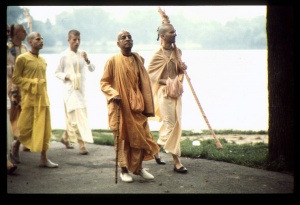CC Madhya 24.279: Difference between revisions
No edit summary |
(Vanibot #0054 edit - transform synonyms into clickable links, which search similar occurrences) |
||
| Line 17: | Line 17: | ||
<div class="synonyms"> | <div class="synonyms"> | ||
''nārada kahe'' | ''[//vanipedia.org/wiki/Special:VaniSearch?s=nārada&tab=syno_o&ds=1 nārada] [//vanipedia.org/wiki/Special:VaniSearch?s=kahe&tab=syno_o&ds=1 kahe]'' — Nārada Muni said; ''[//vanipedia.org/wiki/Special:VaniSearch?s=vaiṣṇava&tab=syno_o&ds=1 vaiṣṇava]'' — O Vaiṣṇava; ''[//vanipedia.org/wiki/Special:VaniSearch?s=tomāra&tab=syno_o&ds=1 tomāra]'' — your; ''[//vanipedia.org/wiki/Special:VaniSearch?s=anna&tab=syno_o&ds=1 anna]'' — food; ''[//vanipedia.org/wiki/Special:VaniSearch?s=kichu&tab=syno_o&ds=1 kichu] [//vanipedia.org/wiki/Special:VaniSearch?s=āya&tab=syno_o&ds=1 āya]'' — does any come; ''[//vanipedia.org/wiki/Special:VaniSearch?s=vyādha&tab=syno_o&ds=1 vyādha] [//vanipedia.org/wiki/Special:VaniSearch?s=kahe&tab=syno_o&ds=1 kahe]'' — the hunter replied; ''[//vanipedia.org/wiki/Special:VaniSearch?s=yāre&tab=syno_o&ds=1 yāre] [//vanipedia.org/wiki/Special:VaniSearch?s=pāṭhāo&tab=syno_o&ds=1 pāṭhāo]'' — whoever you send; ''[//vanipedia.org/wiki/Special:VaniSearch?s=sei&tab=syno_o&ds=1 sei]'' — that person; ''[//vanipedia.org/wiki/Special:VaniSearch?s=diyā&tab=syno_o&ds=1 diyā]'' — giving something; ''[//vanipedia.org/wiki/Special:VaniSearch?s=yāya&tab=syno_o&ds=1 yāya]'' — goes. | ||
</div> | </div> | ||
Latest revision as of 23:06, 19 February 2024

A.C. Bhaktivedanta Swami Prabhupada
TEXT 279
- nārada kahe,—'vaiṣṇava, tomāra anna kichu āya?'
- vyādha kahe, "yāre pāṭhāo, sei diyā yāya
SYNONYMS
nārada kahe — Nārada Muni said; vaiṣṇava — O Vaiṣṇava; tomāra — your; anna — food; kichu āya — does any come; vyādha kahe — the hunter replied; yāre pāṭhāo — whoever you send; sei — that person; diyā — giving something; yāya — goes.
TRANSLATION
"Nārada Muni then asked the hunter, ‘My dear Vaiṣṇava, do you have some income for your maintenance?' "The hunter replied, 'My dear spiritual master, whoever you send gives me something when he comes to see me.'
PURPORT
This confirms the statement in the Bhagavad-gītā (BG 9.22) to the effect that the Lord carries all necessities to His Vaiṣṇava devotee. Nārada Muni asked the former hunter how he was being maintained, and he replied that everyone who came to see him brought him something for his maintenance. Kṛṣṇa, who is situated in everyone’s heart, says, “I personally carry all necessities to a Vaiṣṇava.” He can order anyone to execute this. Everyone is ready to give something to a Vaiṣṇava, and if a Vaiṣṇava is completely engaged in devotional service, he need not be anxious for his maintenance.